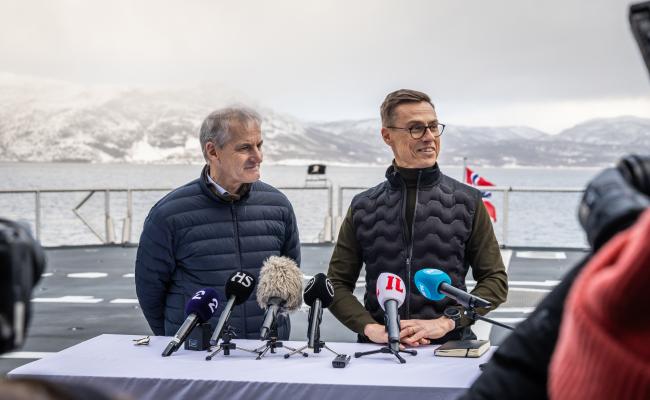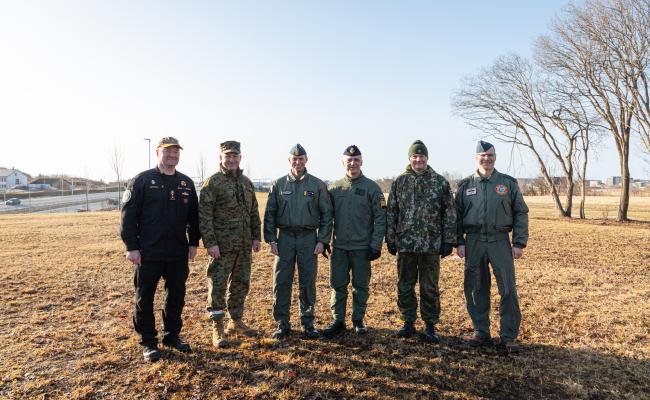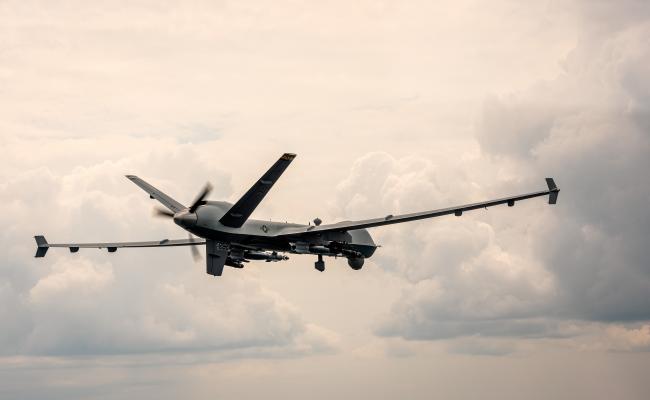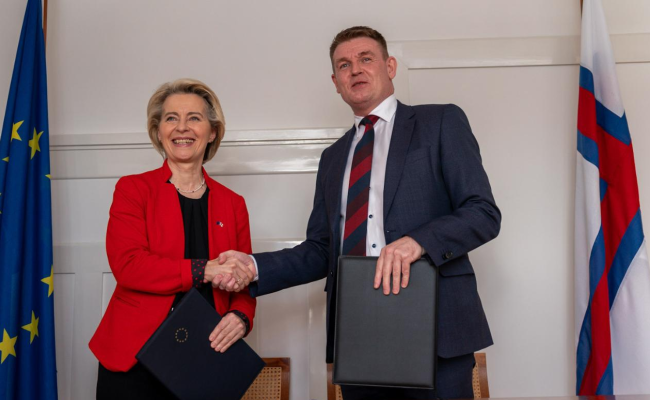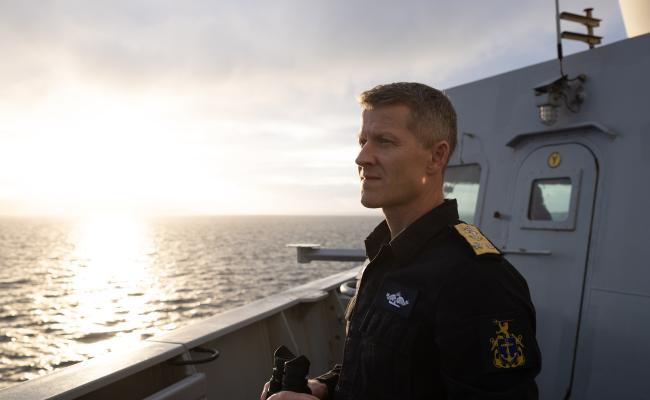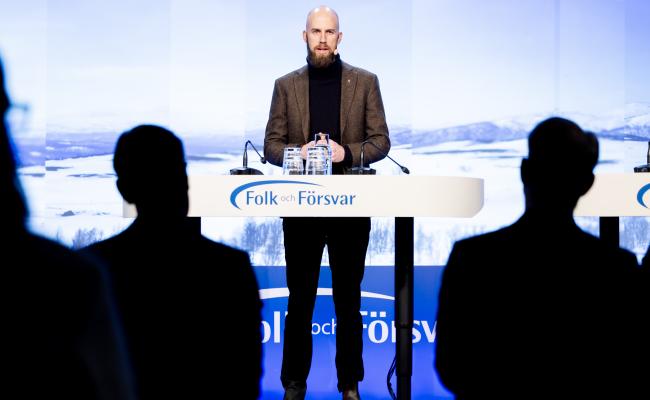New Vision for Nordic Defense Cooperation: Eight Areas for Vigorous Joint Action
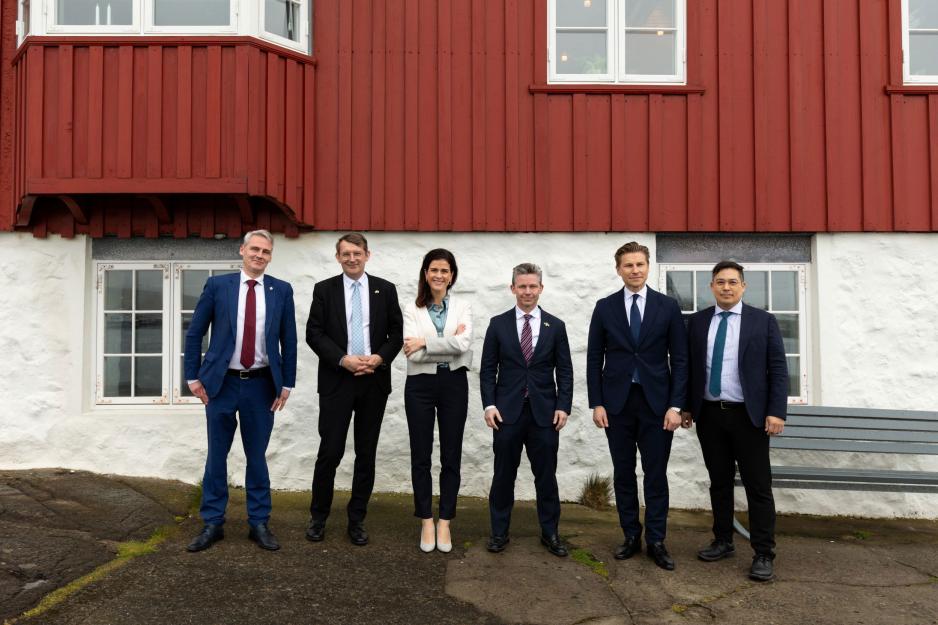
The recent ministerial meeting of the Nordic Defense Cooperation (NORDEFCO) was held in Tòrshavn, the capital of the Faroe Islands. From the left: the Faroese MFA Høgni Hoydal; Denmark's MoD Troels Lund Poulsen; Iceland's MFA Thórdís Kolbrún Reykfjörd Gylfadóttir; Sweden's MoD Pål Jonson; Finland's MoD Antti Häkkänen, and Greenland's Permanent Secretary of Statehood and Foreign Affairs, Mininnguaq Kleist. Norway was not physically represented at the meeting. (Photo: Erla Ziskasen)
A united Nordic region in NATO now join forces to lift the Nordic defense cooperation into a new era. "Russia will remain a threat against European and global security for the foreseeable future," believes the Nordic allies, wanting to engage in operational military interaction.
The five Nordic states have written the introduction to a new far-reaching chapter of defense cooperation between them:
They have now launched the ambitious vision for the development of the Nordic Defense Cooperation (NORDEFCO), which was announced to ble underway last summer.
It sets eight areas of strengthened inter-Nordic efforts. Some of the key words include cooperation on situational awareness and escalation management, military operations, border-crossing logistics, defense materiel and capabilities, as well as total defense, and supply security.
This look toward the future is based on two aspects in particular – an agreed consideration of Russia's behavior in Ukraine and threatening potential, and the fact that the entire Nordic region has finally joined NATO.
“The Nordic countries are united in the assessment that Russia will remain a threat to European and global security for the foreseeable future. We are equally united in the understanding of the need for collective actions to counter this threat. For the first time in modern history, with the accession of Finland and Sweden to NATO, our countries have chosen the same path for our security policy,” says the Nordic defense ministers in a joint statement.
NORDEFCO in short
• NORDEFCO was established in 2009 by the five Nordic states: Denmark, Finland, Norway, Sweden, and Iceland.
• The overarching aim is to strengthen the participants’ national defense, explore common synergies, and facilitate efficient common solutions.
• The cooperation takes place at both the political and the military level.
• The chairship alternates between the former four states. Last year, the format was led by Sweden. Denmark holds the chairship this year.
Eye on the Arctic and the North Atlantic
"In the Nordic countries, we have a particular responsibility for our joint security in the region, which is also important to NATO. We have a clear ambition for low tension in the region," says the Danish MoD Troels Lund Poulsen (Liberal Party).
As this year's chair of NORDEFCO, Denmark invited to the ministerial meeting at which the new vision was signed.
The meeting took place last week in the Faroese capital, Tórshavn. It was jointly hosted by Denmark and the Faroe Islands – and included Greenlandic participation.
The Faroe Islands and Greenland are countries within the Kingdom of Denmark with far-reaching self-governance. Traditionally, however, they have not had a seat at the ministerial table during discussions on international defense matters.
Therefore, the choice of meeting location and the extended guest list are significant. The backdrop is the commonwealth's strengthened defense cooperation and a wish to focus on the security situation in the Arctic and the North Atlantic, informs the Danish Ministry of Defense.
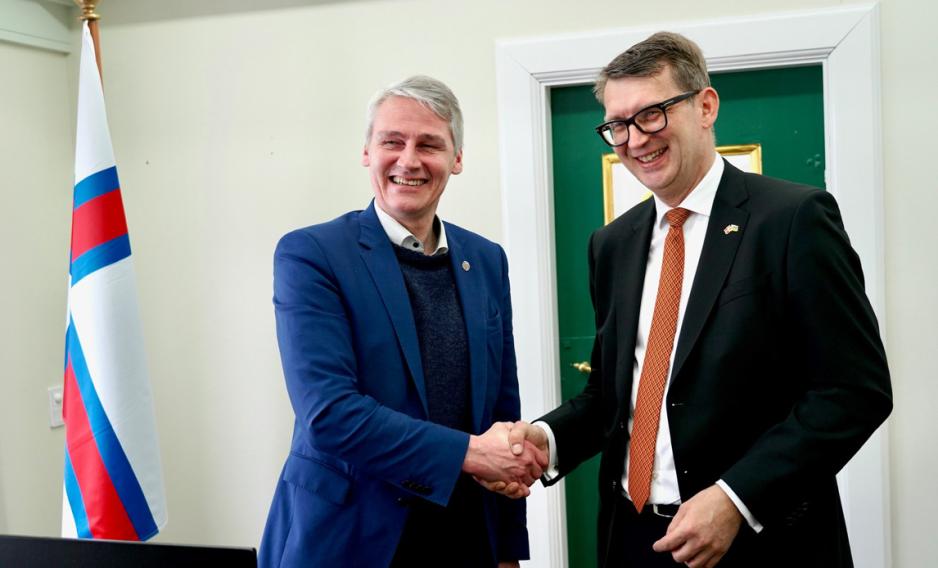
The co-hosts for the NORDEFCO meeting, Faroese MFA Høgni Hoydal and Danish MoD Troels Lund Poulsen; here in Tórshavn during talks on security cooperation last spring. The governments of the Faroe Islands and Greenland are now being involved by the Danish government in agreements within Denmark's new settlement on the defense area. (Photo: the Danish Ministry of Defense)
"Sadly, the kingdom and our Nordic allies are not just challenged by conventional threats, but also by new hybrid threats, such as cyber-attacks and attacks on critical infrastructure," MoD Poulsen points out and continues:
"We therefore work to protect our joint security – for the benefit of the alliance and not least the inhabitants of the Arctic and the North Atlantic. Thus, it is very valuable that the NORDEFCO meeting includes participants from the Faroe Islands and Greenland."
Seeking active involvement
"Nothing about us without us," is regularly emphasized by the Greenlandic side. At the NORDEFCO meeting, Greenland was represented by the Permanent Secretary of Statehood and Foreign Affairs, Mininnguaq Kleist.
The Faroe Islands also want active involvement in forums where foreign and security policy matters that are relevant for the archipelago are discussed," states Faroese MFA Høgni Hoydahl (Tjóðveldi), the specific co-host of the meeting.
"In light of a rapidly changing security situation, the importance of Nordic cooperation has become urgently relevant – particularly regarding security and defense policy. Nordic values like unity, thoroughness, and innovation make for good tools to navigate an increasingly complex and unpredictable world," notes Hoydal.
"We are prepared to contribute actively from the Faroese side to maintain peace and security in the region, as well as supporting NATO's deterrence posture," he maintains.
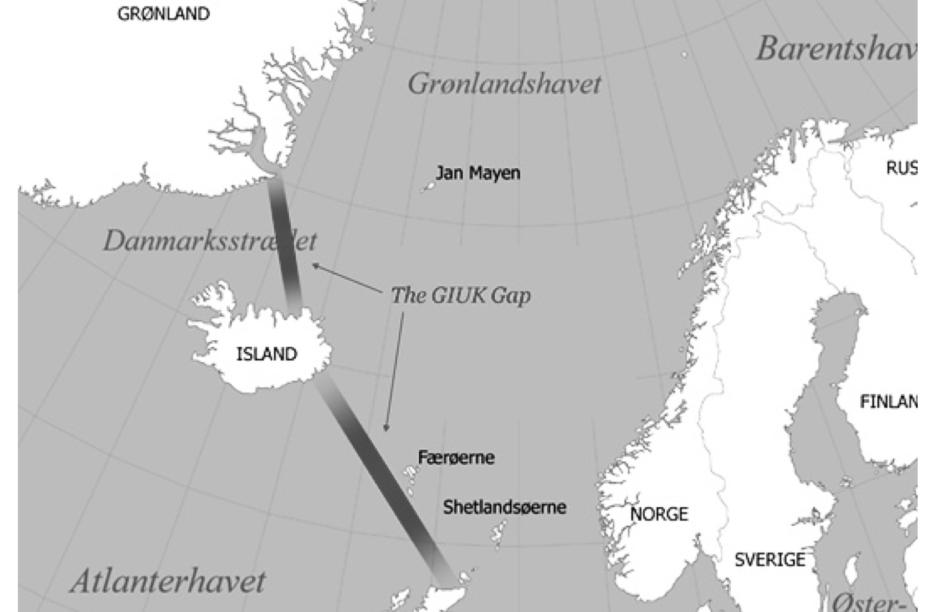
The security situation in the Arctic and the North Atlantic (as shown on the map), as well as transatlantic communications, are of significant priority to Denmark's chairship of NORDEFCO. With long-range drones and air warning radar on the Faroe Islands, Denmark seeks to strengthen the surveillance of the GIUK Gap, two strategically significant stretches in the ocean areas between Greenland, Iceland, and the UK. Norway is also making efforts to increase surveillance of sea areas in the High North with long-range drones. (Map: the Greenland Card, University of Copenhagen)
United expertise and strength
"Altogether, we have unique knowledge of the North Atlantic, the Arctic and the Baltic Sea, and an almost 1500 kilometers long land border with Russia. In total, we have over 250 fighter planes and 350,000 soldiers. Together, we will be able to provide the conditions required for the reception, deployment, and further movement of allied troops to and through our countries," write the MoDs of Sweden, Denmark, Finland, and Norway, as well as Iceland's MFA, in the Swedish daily newspaper Dagens Nyheter.
Future plans
The first point of Vision 2030 is precisely the joint commitment to strengthened deterrence and defense of the Nordic region and the Euro-Atlantic area.
"The Nordic countries are prepared and able to conduct combined joint military operations to manage both present and future challenges together and with NATO allies. Nordic Defense Cooperation complements and contributes to European and transatlantic security and collective defense," the vision reads.
Anchored in shared values and security interests, the Nordic defense cooperation has developed through NORDEFCO, as well as bilateral and trilateral initiatives, the five states point out.
They also state the following, likely with a view to both perceived effects in the present and an imagined future ideal state:
"Closer defense cooperation between the Nordic countries strengthens security and defense, promotes regional security and stability, facilitates crisis management, and strengthens the military capabilities. The Nordic countries continue to enhance cooperation on total defense to improve resilience."
NATO-oriented
By extension, the vision is designed to leave no doubt: The Nordic defense cooperation will be strengthened within an overarching NATO framework – not as a side initiate or alternative to the alliance.
In that regard, it is similar to the framing of EU's security and defense policy, emphasizing that it complements rather than competes with NATO.
"Aligning Nordic defense cooperation with NATO supports and contributes to the collective defense of the Alliance. As NATO members, the Nordic countries are committed to assist each other and other allies," writes the states and continues:
"Furthermore, the Nordic countries will align defense capabilities in accordance with national interests and defense responsibilities in NATO. Nordic defense cooperation will enhance NATO’s posture in Northern Europe and contribute to the security of the Alliance as a whole."
The efforts within NORDEFCO are in line with the alliance's planning and concepts, it is also specified. In addition, the Nordic interaction is seen in the context of other relevant formats and agreements:
"Nordic defense cooperation complements and adds value to the EU, bilateral defense arrangements, and regional cooperation formats, such as the Joint Expeditionary Force."
Upcoming efforts
The aforementioned main lines will be put into practice with joint measures in eight areas by 2030. See the following overview.
Nordic defense coperation will be strenthened in the following areas:
1. Strategic dialogue and consultations on current issues and the security situation, including cooperation on situational awareness and escalation management.
2. Ability to conduct and command combined joint operations through common operations planning, complementary to national and allied planning.
3. Host Nation Support and logistical support to enable common operations and facilitate allied military support and reinforcement.
4. Military mobility to, between, and through the Nordic countries by ensuring minimal restrictions of movement.
5. Capabilities, based on strategic and operational requirements, in alignment with NATO processes and opportunities in relation to EU tools and initiatives.
6. Defense materiel cooperation for increased interchangeability, including joint acquisitions, based on capability development and requirements, in alignment with NATO processes, NORDEFCO operational needs, and opportunities in relation to EU tools and initiatives.
7. Military security of supply for improved resilience, e.g., by strengthening the Nordic defense industrial base.
8. Total defense to secure adequate support from all sectors of society to the defense sector in all threat scenarios and situations.
Operational military cooperation
"The new vision entails a major change for NORDECO and the cooperation between our countries. The most significant change is that operational cooperation is now also included," says Finland's MoD Antti Häkkänen (National Coalition Party).
The joint planning and execution of military operations have previously been the subject of trilateral memorandums of understanding between Nordic countries – such as Finland, Norway, and Sweden – but is now highlighted as an all-Nordic focus area by the vision.
At the Tórshavn meeting, another essential agreement was reached in this context: In the coming time, the five states' chiefs of defense will continue the work to develop a Nordic defense concept for operational military cooperation – and aim to present this at NORDEFCO's ministerial meeting in Copenhagen, Denmark, in November 2024.
The concept is intended to fully support NATO's operational planning and will play an important role in achieving the goals of the Vision 2030.
"We will strengthen joint regional deterrence and our ability to carry out joint defense operations and those of the alliance. The main focus is on developing interoperability, which means ensuring that we can work as smoothly as possible together and with our allies in all situations," states Häkkänen.
Recent agreements reached within NORDEFCO
• November 2022: Norway, Finland, and Sweden signed an updated letter of intent for increased operational cooperation focusing on the Cap of the North. The previous agreement was concluded in the fall of 2020. This agreement includes, among other things, a new and tighter army cooperation.
• February 2022: Norway, Sweden, Finland, and Denmark signed a contract on the joint procurement of combat uniforms. Deliveries started in the fall of the same year, according to the Norwegian Defense Materiel Agency.
• September 2021: Norway, Sweden and Denmark signed a letter on intent for strengthened operational cooperation with a view to the southern parts of Scandinavia.
Central facets of the discussions
By extension, the following extracts from the declaration of the meeting are particularly relevant:
• "The ministers emphasized the importance of NATO’s regional plans for the Arctic, North Atlantic, and Nordic region, the significance of the trans-Atlantic strategic lines of communication, and the ambition of maintaining peace and stability in the region."
• "The Ministers reaffirmed the ambition to increase situational awareness and further strengthen military mobility and cross-border activities in the Nordic region. This includes the development of strategic corridors in line with NATO decisions, with a long-term goal of “Seamless Movement in a Borderless Nordic”. The Nordic counties are committed to the enablement of allied operations in the Nordic region."
Norway, Sweden, and Finland recently announced a strengthening of their cooperation on border-crossing transport corridors, particularly focusing on military mobility.
• "The ministers also discussed cyber security issues and emphasized the need to tackle threats against critical infrastructure and increasing resilience to withstand the complexity of hybrid threats."
Of historic significance
With the establishment of a new joint vision from a shared allied standpoint – and discussions including the Faroe Islands and Greenland – the meeting in Tórshavn proved historic in many ways.
That is noted by Thórdís Kolbrún Reykfjörd Gylfadóttir (Independence Party), Iceland's MFA with defense policy responsibility.
"We have set a new future strategy for Nordic defense cooperation under completely changed security conditions – and now with all the Nordics within the framework of the North Atlantic Treaty," she remarks and continues:
"The cooperation between the countries has strengthened rapidly in the past years with active participation from Iceland. Good and close cooperation between the Nordics increases the security of the citizens while also strengthening the countries' contribution to the joint defense of the alliance."
Iceland does not have its own armed forces, with the exception of a paramilitary coast guard. However, the country operates an air defense and surveillance system, which is part of the NATO integrated air defense system. Allies, such as Norway in recent years, conduct the NATO-led mission on periodic fighter preparedness and surveillance of Icelandic airspace, Iceland Air Policing (IAP).
In later years, allied nations, particularly the US, have strengthened their military presence in Iceland. American forces use Keflavìk Air Station for operations employing strategic bombers and maritime surveillance aircraft, as well as Icelandic waters in connection with submarine operations.
Nordic union with Ukraine
Norway's MoD Bjørn Arild Gram (Centre) also characterizes the NORDEFCO meeting as a historic milestone, although not being physically present on the Faroe Islands. The background for this is not informed by his ministry.
"In the Nordic region, we share history and geography, as well as fundamental values and security interests. Now, we are all part of the same alliance. Our contribution to NATO's deterrence and defense – through our geography, capacities, and forces – is significant," he maintains.
Russia's continued warfare against Ukraine and Nordic contributions to the Ukrainian defense was also a topic of discussion at the meeting. The ministers reiterated their solid and unwavering support for Ukraine, according to the declaration.
"The Ukrainian people have demonstrated enormous resilience, courage, and skill in the face of Russian aggression. They fight for us all – for freedom, self-determination, and democracy. Therefore, it is our duty to continue to support Ukraine with military equipment, training, and humanitarian and financial support as long as necessary," says Gram.



